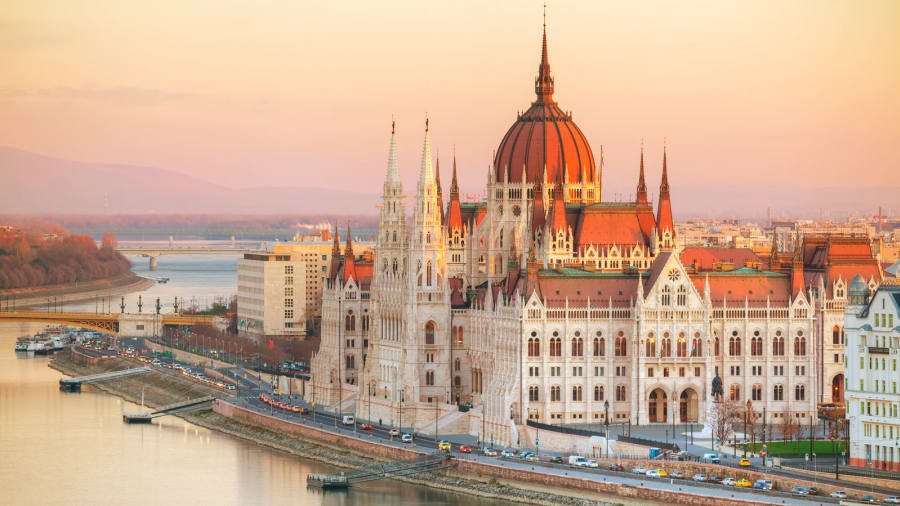How powerful is your passport? 1:09
(CNN) –– For most people, the coronavirus pandemic has meant fewer travel options. However, this is not the case for extremely wealthy families who are increasingly using their money to cross borders that would otherwise be closed to them.
This is the elite world of investment migration, where passport applications are based not on nationality or citizenship, but on wealth and a willingness to move around the planet.
These so-called citizenship-by-investment (CIP) programs are currently a growing sector, as are residency-by-investment agreements, also known as "golden visas."
- PHOTOS | The most powerful passports in the world
They are a way for billionaires to not only diversify their portfolio, by moving their money to a country, but also receive the benefits of citizenship, including a new passport.
Over the past 5 to 10 years, the primary motivations for CIP recipients - who typically have a net worth between $ 2 million and more than $ 50 million - have been freedom of movement, tax benefits, and financial factors. lifestyle, such as better education or civil liberties.
But with Covid-19 drastically transforming our 2020, some elite families are also considering criteria such as healthcare, pandemic responses, and possible safe havens to ensure a plan B in the future.
Plan B
"People really want the alternative citizenship insurance policy, which gives them a plan B," Dominic Volek, Asia director for Henley & Partners, a global citizenship and residency advisory firm, told CNN Travel.
"They are also concerned about medical care and preparedness for a pandemic because, of course, this may not be the only one in our life," he added.
"Rich people do not plan 5 or 10 years, but more than 100 years in advance, in terms of wealth and well-being," he added.
Although it may be largely anecdotal, Henley & Partners suspects that a recent surge in interest in CIPs may be linked to the coronavirus, health problems, and "general doomsday predictions."
The company registered a 49% increase over last year in inquiries between January and June 2020.
In addition, the number of people who applied after a consultation increased by 42% when comparing the last quarter of 2019 with the first quarter of 2020.
Mighty Montenegro
When it comes to specific citizenship programs, Montenegro and Cyprus are the most popular, with new applications growing by up to 142% and 75%, respectively, in the first quarter of 2020 versus the fourth quarter of 2019. Meanwhile, Malta has maintained a constant interest.
"Many people in this extremely high net worth group are interested in Cyprus and Malta, because it gives the applicant and their family unlimited access and freedom of settlement throughout the European Union," Volek explained.
"They not only have greater freedom of movement, but also better education and health care (than in their home countries)."
- READ: OPINION | The US passport, once awarded, is now under suspicion
Residency programs in Australia and New Zealand are also in high demand, but for another reason: crisis management.
"New Zealand has emerged victorious in terms of how it handled the pandemic, compared to some of the other generally more favored destinations like the UK or the US," Volek stressed.
“So we have definitely seen a huge increase in inquiries about investment visas from Australia and New Zealand. That was probably also spurred on by articles about these guys from Silicon Valley, who participated in various investment visa programs before the pandemic and put doomsday plans in place, "he added.
Investment of 6.5 million dollars
Only extremely high net worth families can participate in these residency programs: Australia's program costs $ 1 to $ 3.5 million, while New Zealand's is $ 1.9 million to $ 6.5 million .
"The New Zealand program is quite flexible in terms of what you invest, as long as it is not for your personal use," Volek said.
“Many of these people have invested that NZ $ 10 million in creating a completely self-sustaining, non-dependent commercial farm. So they also have a place to go and just wait at times like these.
CIPs' clientele is also changing: US, Indian, Nigerian and Lebanese applicants have shown the largest increases in requests over the past nine months.
- LOOK: These are the 10 most powerful passports in the world in the middle of a pandemic
US applications, in particular, soared 700% in the first quarter of 2020, compared to the last quarter of 2019.
These ultra-elite folks join a steady stream of investors from China and the Middle East.
Covid-19 free paradises
Some ultra-wealthy travelers are simply looking for a safe and remote place where they can protect themselves with their family in the event of another outbreak.
Even if they don't get immediate access, they want to be prepared for the next pandemic.
"The conversation so far is that smaller countries can manage and control the pandemic more easily," Nuri Katz, founder of international financial advisory firm Apex Capital Partners, told CNN Travel.
“So in America it is totally out of control. But the smaller countries have not been so affected. For example, in Caribbean countries such as Dominica, Antigua and Barbuda or San Cristóbal, there are very few cases of covid-19 ", she commented.
- LEE: The "immunity passports" of the new coronavirus are a terrible idea that could be counterproductive, experts warn
"It seems that these small countries are reopening and there is a feeling that they will be able to handle this problem much better than the large countries," Katz added. "So there is a lot of interest in that in terms of healthcare and lifestyle."
In addition, small island countries in the Caribbean offer relatively cheap IPC and with greater freedom of travel.
“If you have a net worth of about $ 1 million to, say, $ 5 or $ 10 million, the Caribbean is a great option. For example, a millionaire from Bangladesh has one of the worst passports in the world in terms of freedom of travel: you need a visa to go anywhere, ”said Volek.
"If you donate $ 100,000 to the government of Antigua and Barbuda, plus additional fees, your family of four can get a second passport in approximately four to six months."
Avoid bans
Katz has also noticed the start of another trend: investing in passports to increase your chances of avoiding travel bans in the future.
As some countries open, they will only allow certain passports to enter. For example, Europeans cannot visit the United States, and vice versa.
However, the holder of a Cyprus passport could travel within the European Union when the borders are open.
"People are thinking, well, this is going to be there for a while," Katz said. "How do we adjust our assets, including our citizenships, so that we can have the kind of lifestyle we want?"
"People who want to travel freely in Europe are beginning to think about obtaining some kind of status (citizenship or resident)."
The basics of investment immigration
Saint Kitts and Nevis pioneered citizenship-by-investment (CIP) programs.
Investment migration programs offer residences or citizenships in exchange for a significant investment in a country's economy, usually in the form of real estate, job creation, infrastructure development, or government bonds.
The first CIP was implemented in 1984 by San Cristóbal in the Caribbean. Since then, dozens of countries have established programs, including Austria, Cyprus, Malta, Moldova, Saint Lucia, Turkey, Antigua and Barbuda, Dominica, Greece, Montenegro, and many more.
Some require applicants to establish nonprofits, companies that create local jobs, or live in the country for a specified period. Others allow applicants to invest in government bonds, real estate, and development projects remotely.
Depending on the country, these programs can cost from $ 100,000 as in Antigua and Barbuda to $ 250,000 in Saint Kitts and Nevis, $ 280,000 in Greece, $ 380,000 in Portugal, $ 1.1 million in Malta and $ 2.4 million in Cyprus.
"I think a country like Portugal is one of the most attractive because the price of € 350,000-500,000 is achievable for high net worth individuals," Volek said.
"Then you get visa-free access to the Schengen area and there is a clear legal path to citizenship after five years of residence, as long as you can also speak elementary-level Portuguese," he explained.
"But if the client has the financial capacity, then it is direct to Malta or Cyprus because it would obtain the citizenship of the European Union immediately," he completed.
The process to acquire CIP
In 2017, Katz estimated that around 5,000 people a year acquired citizenship abroad through CIPs. In 2020, she places that number closer to 25,000, although there are no official figures.
Even when billionaires turn to CIPs as a plan B, the reality is that these programs take time.
"There is simply no way that a Russian oligarch can come in, hand a million dollars to a politician and walk away with a passport," Volek explained. "Obviously that is not the case."
Depending on the country, the due diligence process can take from several months to a few years.
Applicants will generally undergo extensive financial and criminal evaluations to ensure the money was legally obtained, prior to approval of their residency or citizenship.
Taking Malta as an example, Volek explained that the country requires a strict four-tiered due diligence process that begins with initial verification by Henley & Partners.
"The applicant has to reveal his net worth and the source of the funds, as well as provide certificates of police authorization in his country of birth, country of citizenship and where he has lived for more than six months in the last 10 years ...", he said .
'Malta has a rejection rate of between 20 and 25% of applications. You can reject the applicant if you are not comfortable with this person acquiring citizenship, "she explained.
Criticism the «golden visa»
Investing in the Malta program can be a quick route to European Union citizenship (Credit: courtesy Malta Tourism Authority).
Supporters of CIPs argue that with these programs you win both parties: Applicants invest in developing countries to offset the costs of natural disasters, industry collapses, pandemics, or simply boost certain sectors of the economy.
At the same time, the individual can diversify their own assets while enjoying greater freedom of movement, a better lifestyle, and peace of mind in times of crisis.
But some experts suggest that it is not so clear.
In 2018, for example, Transparency International, a global coalition against corruption, criticized citizenship and residency-by-investment schemes in Malta, Cyprus, Portugal and Spain, arguing that these programs are 'selling access to the Schengen travel area, which is not it requires a visa, and even citizenship of the European Union, to foreign investors with little scrutiny, transparency or due process.
Kate Hooper, an associate policy analyst at the Washington-based Migration Policy Institute's international program, told CNN Travel that CIPs often arouse suspicion as some governments do not disclose their due diligence processes.
"Numerous reports have raised concerns about how effective these processes really are in screening people and eliminating dirty money," Hooper told CNN Travel in 2017.
"Over the years, there have been a handful of cases where citizenship has been granted to people without proper evaluation," he explained.
George DeMartino, professor of international economics and ethics at the University of Denver, said that CIPs can also exacerbate inequality.
"Programs like these threaten to diminish the political fraternity by granting special privileges to the already privileged," DeMartino noted in a previous conversation with CNN.
“They give those who have the least need to migrate and achieve citizenship in a new country the greatest opportunity to do so, while those who are much more desperate to migrate, such as those facing dire economic circumstances at home, are totally excluded from the benefits of these programs, "he said. And she completed: "The programs are not the cause of this inequality, but they amplify it."
InvestmentsPassports





/cloudfront-eu-central-1.images.arcpublishing.com/prisa/BUA2NNBCCBACHEPXXR6NIRKCA4.jpg)



/cloudfront-eu-central-1.images.arcpublishing.com/prisa/4BJPW7YRQJPSPCRLB5V3IJXJLM.jpg)





